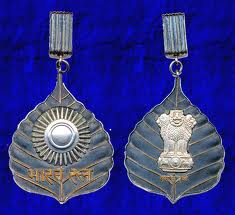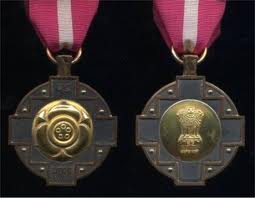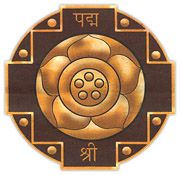Padma awards
(→The legal aspect) |
(→PADMAAWARDS CONFERRED ON REPUBLIC DAY 2011) |
||
| Line 51: | Line 51: | ||
etc. Padma Awards are announced on the eve of the Republic Day every year. | etc. Padma Awards are announced on the eve of the Republic Day every year. | ||
| − | == | + | ==2011== |
| + | '''PADMA AWARDS CONFERRED ON REPUBLIC DAY 2011''' | ||
===Padma Vibhushan Recipients=== | ===Padma Vibhushan Recipients=== | ||
Revision as of 20:51, 21 August 2013
This is a collection of articles archived for the excellence of their content. Readers will be able to edit existing articles and post new articles directly |
This article has been sourced from an authoritative, official After the formal launch of their online archival encyclopædia, |
Contents |
The source of the first part of this article
INDIA 2012
A REFERENCE ANNUAL
Compiled by
RESEARCH, REFERENCE AND TRAINING DIVISION
PUBLICATIONS DIVISION
MINISTRY OF INFORMATION AND BROADCASTING
GOVERNMENT OF INDIA
Padma awards
Padma awards are amongst the highest civilian awards of the country. There are three categories of Padma Awards - 'Padma Vibhushan', 'Padma Bhushan' and 'Padma Shri'. These are given for distinguished service in any field including Art, Literature and Education, Science and Engineering, Sports, Medicine, etc. Padma Awards are announced on the eve of the Republic Day every year.
2011
PADMA AWARDS CONFERRED ON REPUBLIC DAY 2011
Padma Vibhushan Recipients
Shri Montek Singh Ahluwalia
Dr. Vijay Laxman Kelkar
Dr. Sitakant Mahapatra
Shri K. Parasaran
Shri Azim Premji
Dr. Akkineni Nageswara Rao
Professor Palle Rama Rao
Smt. Homai Vyarawalla
Dr. Akhlaq Ur Rahman Kidwai
Prof. O.N.V. Kurup
Shri Brajesh Chandra Mishra
Dr. (Smt.) Kapila Vatsyayan
Padma Bhushan Recipients
Shri S.P. Balasubrahmanyam
Shri Mahesh Nilkanth Buch
Shri C.V. Chandrasekhar
Shri Yogesh Chander Deveshwar
Shri Sankha Ghosh
Shri Khayyam
Shri Madavoor Vasudevan Nair
Dr. S. Ramachandraan
Smt. Shobhana Sitaram Ranade
Dr. G.V.K. Reddy
Smt. Waheeda Rehman
Shri Analjit Singh
Dr. Surendra Singh
Dr. Rudrapatna Krishna Sastry Srikantan
Dr. K. Raghavan Thirumulpad (Posthumous)
Shri Rajshree Birla
Shri Ajai Chowdhry
Shri Satyadev Dubey
Shri T.RS,.S. George
Shri S. Gopalkrishnan
Dr. Keki Byram Grant (Posthumous)
Shri Shashi Kapoor
Shri Krishen Khanna
Smt. Chanda Kochhar
Shri Dwijen Mukherjee
Dr. Ramdas Madhav Pai
Shri Dasharath Patel (Posthumous)
Shri Rajendra Singh Pawar
Dr. Kallam Anji Reddy
Shri Shyam Saran
Ms. Arpita Singh
Padma Shri Recipients :
Shri Mamraj Agarwala
Shri Mecca Refeeque Ahmed
Prof. M. Annamalai
Dr. Jockin Arputham
Shri Granville Austin
Dr. Pukhraj Bafna
Dr. Mani Bhaumik
Ms. Urvashi Butalia
Shri Ajoy Chakrabarty
Smt. Nomita Shipra Chandy
Dr. Neelam Man Singh Chowdhry
Dr. Pravin Darji
Dr. Chandra Prakash Deval
Smt. Mahasundari Devi
Ms. N. Kunjarani Devi
Prof. (Dr.) Madhukar Keshav Dhavalikar
Shri Gajan Govardhana
Dr. Mansoor Hasan
Dr. Indira Hinduja
Shri Shaji Neelakantan Karun
Shri Sat Pal Khattar
Shri Balraj Komal
Shri Sushil Kumar
Smt. Rajni Kumar
Smt. Shanti Teresa Lakra
Shri V.V.S. Laxman
Shri Devanoora Mahadeva
Ms. Shital Kamalakar Mahajan
Dr. Shyama Prasad Mandal
Dr. M.H. Mehta
Shri Ritu Menon
Dr. Azad Moopen M
Prof. (Dr.) Bhalchandra Vana Nemade
Dr. Jose Chacko Periappuram
Prof. Karl Harrington Potter
Shri Dadi Dorab Pudumjee
Prof. Riyaz Punjabi
Prof. Koneru Ramakrishna Rao
Smt. M.K. Saroja
Shri P.K. Sen
Shri Anant Darshan Shankar
Shri Khangembam Mangi Singh
Shri Jayaram Subramaniam
Ms. Tabu
Shri Prahlad Singh Tipanya
Dr. Om Prakash Agarwal
Prof. (Dr.) M. Ahmed Ali
Prof. (Dr.) Upendra Baxi
Shri Mahim Bora
Prof. Pullella Sri Rama Chandrudu
Dr. Martha Alter Chen
Ms. Mamang Dai
Smt. Kajol Devgan
Shri Makar Dhwaj Darogha
Prof. (Dr.) Devi Prasad Dwivedi
Smt. Sunayana Hazarilal
Prof. S.R. Janakiraman
Dr. Girish Kasaravalli
Shri Sahabzade Irrfan Ali Khan
Prof. Krishna Kumar
Shri Peruvanam Kuttan Marar
Shri Barun Mazumder
Shri Jivya Soma Mhase
Smt. Gulshan Nanda
Shri Gagan Narang
Dr. Avvai Natarajan
Smt. Sheela Patel
Smt. Kshemavathy Pavithran
Prof. (Dr.) A. Marthanda Pillai
Smt. Krishna Poonia
Shri C. N. Reghavendran
Shri K. Raghavendran Rao
Ms. Anita Reddy
Dr. Suman Sahai
Smt. Buangi Sailo
Shri Gopalan Nair Shankar
Prof. D.D. Sharma
Prof. Nilamber Dev Sharma
Prof. E.A. Siddiq
Shri Harbhajan Singh
Dr. Subra Suresh
Shri Kanubhai Hasmukhbhai Tailor
Smt. Usha Uthup
Prof. (Dr.) Sivapatham Vittal
Shri Narayan Singh Bhati Zipashni
The legal aspect
A limit on the number of awards?
Will govt restrict No. of Padma awards?
Dhananjay Mahapatra
The Times of India 2013/08/12
In July 2013, the government issued a revised format for aspirants to apply for Padma awards, the highest state conferred civilian decoration.
In the five years 2008-12, the government has conferred over 600 awards—38 Padma Vibhushan, 155 Padma Bhushan and 416 Padma Shri— on people who could be put in three categories—well-known, not so well-known and unknown.
Given the snob value of perceived national (political) recognition through Padma awards, there has been a mad scramble for it in the past.
Every year, a flood of applications deluge a high-level awards committee. Applicants employ the art of verbose eulogy about their achievements. The committee waddles through reams of paper before shortlisting the winners, announced on the eve of Republic Day .
To limit the verbal diarrhoea, the home ministry this year has asked aspirants not to exceed 800 words for their achievements.
How are the awardees selected and do they really deserve the nation’s highest civilian recognition? Is it just political expediency, appeasement, placation or quid pro quo?
Are these akin to titles like Rai Saheb or Rai Bahadur conferred by the colonial masters on their most loyal subjects?
Supreme Court 1995: Balaji Raghavan and S P Anand vs Union of India
Reflection of these questions can be seen in the Supreme Court’s 1995 judgment in Balaji Raghavan and S P Anand vs Union of India. It had said, “During the British occupation, India has had a spate of title hunters who brought degradation and much harm to healthy public life. The title hunters have always been considered a menace to the safe growth of a society.
Though the Padma awards are not titles but in case these awards are given at the whims of the authorities, without a proper criteria and method of selection, they are bound to do more harm to the society than the title-seekers did during the British regime.” Many are genuine achievers and conferment of the awards on them remains beyond the realm of question. But several awardees raise more than a question about their credentials.
Disgusted over indiscriminate conferment of Padma awards, Acharya J B Kriplani had in 1969 moved ‘The Conferment of Decorations on Persons (Abolition) Bill’ in Parliament. N K P Salve, despite agreeing with Kriplani’s concern, had opposed the bill.
Salve had said, “I am aware that the decorations have been bestowed indiscriminately on businessmen and others. In fact, one of my suggestions is that any decoration awarded to any person who is found guilty of any ‘commercial offence’ should be withdrawn. We should be extremely strict about the awarding of decorations. In fact, it is within my knowledge that some of them have put their decorations to commercial exploitation. In fact, a certain managing director of a company wrote a letter to me . On his letterhead was written ‘Ex-Rai Bahadur, Padma Vibhushan’ so and so.”
The Supreme Court in its 1995 judgment disagreed with the petitioners that these awards were akin to titles, which stood abolished by Article 18 of the Constitution.
Amicus curiae Santosh Hegde, who later became a judge of the SC, argued that the Constitution did not envisage state recognition of meritorious services through conferment of awards. But he suggested that to avoid criticism of creating a separate class of awardees, they must not use the awards as either a prefix or suffix to their names.
The court agreed with Hegde’s suggestion but was not averse to conferment of the awards. “The theory of equality does not mandate that merit should not be recognized. In this context, we may refer to the various clauses of Article 51A and specifically clause (j) which exhorts every citizen ‘to strive towards excellence in all spheres of individual and collective activity, so that the nation constantly rises to higher levels of endeavour and achievement’. It is, therefore, necessary that there should be a system of awards and decorations to recognize excellence in the performance of these duties,” the court said.
Should there be a premium put on the awards by limiting the numbers of awardees to a deserving few rather than over a 100 every year? Should the government also put out the reasons why some known performers were rejected or not considered for these awards?
The court had answered this too. “There are no limitations prescribed for the maximum number of awards that can be granted in a given year or the maximum number that is permissible in each category. The Prime Minister’s Committee on Awards & Honours, 1948 had recommended certain limitations in terms of numbers but these have not been incorporated in the extant guidelines,” it said.
While advocating a transparent selection process, the court said, “We may only say that the committee may keep in view our anxiety that the number of awards should not be so large as to dilute their value. We may point out that in some countries, including US, the total number of awards to be given is restricted.”




